The new Men in Black movie, , is rarely ever about the men - and women - in black. I mean, it literally is about them and their journey to sniff out a mole in their London branch. (The big twist won't surprise you.) That's what happens in the movie, and it's all quite loud and diverting, though rarely as fun as it should be. Far more fascinating than all of that, though, is what MIB: International represents.
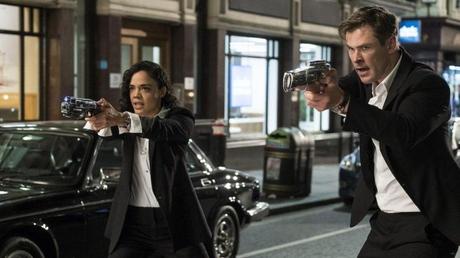
Similar to the way Donald Trump has overtaken every aspect of U.S. politics, everything in Hollywood right now is about Disney. Like our 45th President disrupting the system in a way previously unseen in American history, the Mouse House has reformed the film industry in ways we once would have never thought unimaginable. As such, it's hard for me to look at a new blockbuster movie like Men in Black: International and not see the Disney of it all.
The House that Walt Built has always loomed large as a unique figure in the Hollywood landscape, far more concerned with brand management and vertically integrated entertainment ecosystems - from movies to TV to theme park - than the competition. However, over the past decade CEO Bob Iger's aggressive expansion has steered the studio toward record profits, market share, and consolidation. With a chief competitor like 20th Century Fox already swallowed up by the Disney machine, the rest of Hollywood is either scrambling to scale up through mergers or is always this close to being sold to some tech company.
The Wannabe Disney Syndrome
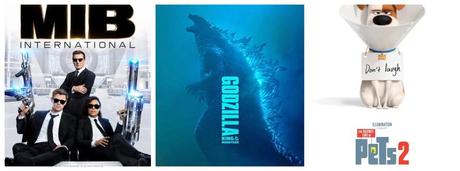
We like what Disney does, but we can sniff out cheap imitations. Moreover, Disney's market dominance has changed the way people think about going to the movies. Theaters are now amusement parks to be visited just a couple of times a year to experience the latest new ride. Most of the time, that means the latest Disney movie with four-quadrant IP appeal and dizzying visuals. Sometimes, it means horror movies since the reactions they can elicit from audiences still qualify as a unique experience. Otherwise, everything else faces a daunting uphill battle. Sorry Booksmart.
As a result, there is a sense that the competition doesn't know what to do. It's stuck in a constant react mode predicated on always trying to chase Disney's tail, and if Disney wants nothing more than to repackage IP into one big movie after another then that's what everyone else will do too, dammit. Naysaysers lament the shortsightedness of it all. After all, eventually IP is going to run out, and audiences can only take so many Terminator reboots. However, I've used this Shawshank Redemption paraphrase before, and I'll do it again: in today's Hollywood, IP is a good thing, maybe the best of things, and no IP ever dies.
And Men in Black was once a very good IP.
Adapted from a relatively obscure early 90s comic book, Barry Sonnenfield's first film in the franchise took a delightfully cartoonish approach to then-prevalent anxieties about big brother, government conspiracies, and tabloid fiction. At the same time that Mulder and Scully were sniffing out cigarette smoking men and shadowy syndicates, Will Smith and Tommy Lee Jones were peeling back the curtain on a world in which mysterious government agents are actually the good guys keeping the peace between us and unseen alien forces.
The world loved it.
Men in Black broke all previous July 4th opening-weekend records. Of course, that was over 20 years ago, meaning all of those records have since been broken several times over, often by Spider-Man movies. However, there was no bigger movie in the summer of 1997 - not even Jurassic Park: The Lost World or Air Force One- than Men in Black. Heck, if not for Titanic there would have been no bigger movie in all of 1997 than Men in Black.
When I say "big" I'm referring to ticket sales and cultural impact. It captured Will Smith at peak-charisma and Tommy Lee Jones at peak-taciturn old man, a role he'd play many times afterward but never so effectively. The movie stayed in theaters for 5 months. When it finally left, an animated series was ready to debut on TV as prelude to what would turn into a four-season run on the Kids' WB. Will Smith's inescapable music video for the title track seemed as inescapable as anything released by the Backstreet Boys that year.
Thanks to that song, the soundtrack hit the top spot on the Billboard 200 for two straight weeks and went platinum three times, serving as the start of Will Smith's comeback as a musician. His album Big Willie Style, released through Sony's Columbia records at the end of the year, sold fourteen million copies. Littered with hits like "Gettin' Jiggy With It" and "Miami," the label made sure to also put "Men in Black" on there for anyone who hadn't already bought the soundtrack.
To any movie lover and/or MTV devotee, Will Smith was simply a part of life back then. And thanks to his movie Men in Black every time my family took our pet pug for a walk we would be told how much she looked like Frank the Pug from "that Will Smith movie."
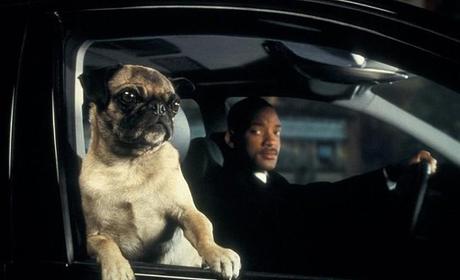 This might also by why everyone I met for the next decade automatically assumed my pet pug Aspen was a boy just like Frank in the movie.
This might also by why everyone I met for the next decade automatically assumed my pet pug Aspen was a boy just like Frank in the movie. The quaint smallness of the first movie
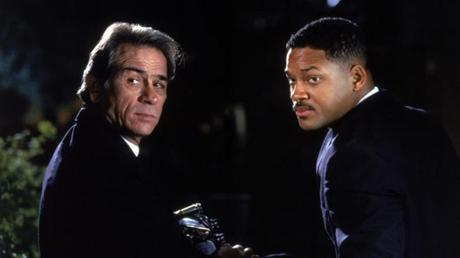
The irony, however, is despite its outsized impact on the pop culture of 1997 Men in Black is actually quite a small movie. It's only 98 minutes long, for starters. It never really leaves New York. Even its country farm scenes with Vincent D'Onofrio are meant to be in upstate New York. One of the biggest action sequences involves a deceptively dangerous rubber ball bouncing wildly off the walls and nearly destroying the agent's headquarters.
It wasn't originally written that way. When Sonnenfeld - fresh off a run that started with The Addams Family in 1990 and ended with Get Shorty in 1995 and included Addams Family Values and For Love or Money somewhere in-between - got the Men in Black script he feared he wasn't right for the job. The story was a globe-trotting adventure taking the agents from Washington, D.C. to Nevada to Kansas, not unlike the previous summer's big hit Independence Day.
As Sonnenfield told Tom Shone:
"I look at those 'big manly movies' with things blowing up and I don't know what to do with them. I said to [executive producer Steven] Spielberg, 'If you want to hire me I would totally rewrite the script and shoot it in New York. We should make The French Connection with aliens and the comedy is we don't acknowledge that dealing with aliens if funny. Ultimately it's going to be a small cop movie. We're making a little buddy movie with smoke and mirrors.' There's no action in the movie, practically. Will runs through some police cars and taxi cabs.
Barry Sonnenfeld, as quoted in Blockbuster: How Hollywood Learned to Stop Worrying and Love the Bomb
Moreover, at Sonnenfeld's direction Men in Black commits what would now seem like a flagrant case of franchise mismanagement: it actually concludes its own story. It's a buddy cop comedy where one half of the duo, Tommy Lee Jones' K, retires at the end, gracefully passing the baton to the next generation as his characters seeks out his bliss in exchange for having his memory erased, a process said to be irreversible. Not even the early Lethal Weapon movies went through on Murtaugh's oft-teased promises of retirement.
However, 1997 is long ago enough that producers could still think of a big budget project like Men in Black as a movie with a story to be told from beginning to end. Granted, the film leaves an opening for a potential sequel featuring Will Smith and new recruit Linda Fiorentino as partners, but Tommy Lee Jones' journey from being a loyal agent to the type of guy who looks to the stars and wonders what could have been is complete.
The inevitable diminishing returns of the sequels
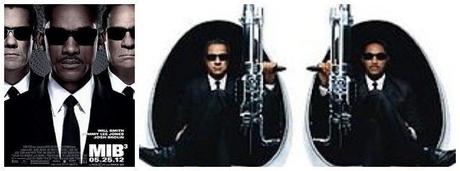
Sony spent two sequels - both also directed by Sonnenfeld - racing to undo all of that "closure" in a bid to get the boys back together. Along the way, Fiorentino was rudely replaced by a talking dog as Smith's assumed new partner. Spielberg negotiated his leverage as producer to take a bigger cut of the profits with each sequel. Ditto for Smith, who also fought for and quite often exercised his right to increased creative control. Men in Black 3, in particular, was such a behind the scenes fiasco of Smith-mandated rewrites that production had to be shut down for three months to settle the disputes between star and studio. As a result, the film barely broke even despite finishing 2012 as the tenth highest-grossing film at the worldwide box office.
(The less said about Smith's attempt at a follow-up song for the Men in Black 2 soundtrack the better.)
Sony's relationship with Smith kept going for a little while longer. However, the failure of 2013's After Earth and 2015 firing of co-chairman Amy Pascal, who always agreed to fund Smith's money-losing passion projects like Ali in exchange for him coming back to do yet another Men in Black or Bad Boys sequel, put an end to that. He moved on to conquering social media and adapting to the franchise times by lending his name to superheroes ( Suicide Squad) and Disney IP ( Aladdin), and Sony moved on to a hopeful next generation of Men in Black stars.
What about a spin-off with new actors? Maybe.
Oh, I know, what about a crazy team-up movie like The Avengers? (Cartoon dollar signs flash in front of my eyes) I'm listening.
First thought: how can we make it more like Disney?
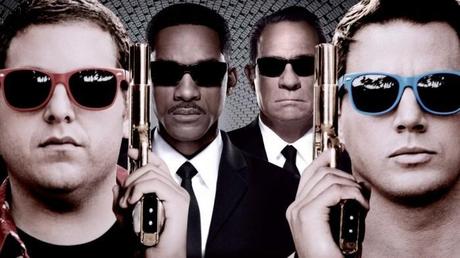
Jonah Hill, for one, was totally down for it, commenting in an email chain, " jump street merging with mib i think that's clean and rad and powerful"
Rad? Maybe. A tentpole team-up movie? 100%. It's what Amy Pascal was desperately searching for to save her job, routinely firing off emails to underlings demanding, "Where's my tentpole? Where's my tentpole?"
Most likely, someone looked up at Disney's billion dollar sales from its 2012 team-up movie, The Avengers, and thought maybe they could do that in a fun way, like a team-up of Men in Black and 21 Jump Street that would be one giant satire of team-up movies.
Like most of the projects Sony put into development at the time, including new Cleopatra and He-Man movies, it didn't end up going anywhere. The project simply fell away. As Men in Black series executive producer Walter F. Parkes told TotalFilm, "It's one of those ideas that, when you first hear it, it's almost like a marketing executive's dream. But when you really come down to it, the two franchises operate on very different principles."
Instead, the franchise would come back as a different kind of Wannabe Disney project.
Haven't we met before?
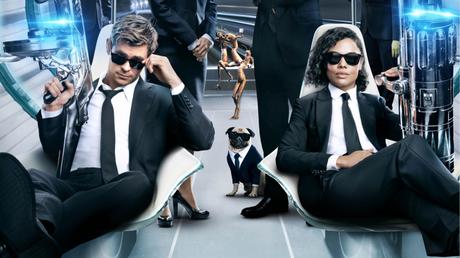 Though there are cameos and scant references to the first 3 films, MIB: International is designed to be a new jumping off point for the franchise, a fresh start for newbies.
Though there are cameos and scant references to the first 3 films, MIB: International is designed to be a new jumping off point for the franchise, a fresh start for newbies. During one of the many MIB: International TV trailers that aired during the NBA Finals, Chris Hemsworth's H character - a rogue, devil may care MIB agent with a tortured past - and Tessa Thompson's M - a bookish newbie who has been obsessed with the agency since childhood - turn to one another and curiously ask, "Don't I know you?" Or maybe they actually say "you look familiar." I don't know. I only saw it once.
Point is: the moment is not in the movie playing in theaters right now. I'm not even sure in what context the scene would fit into the story. Instead, it feels like it was either improvised during a joke take or filmed entirely for marketing purposes, like someone at Sony told director F. Scott Gray to film a quick scene where Hemsworth and Thompsons acknowledge the obvious: they're just playing their Thor: Ragnarok characters all over again.
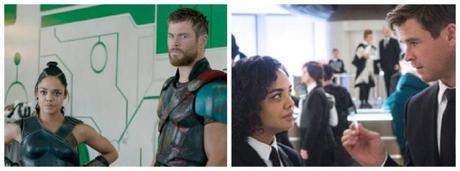
Except they're not. OK, he is. Newly liberated to pursue his goofier comic instincts, Hemsworth is doing his adorably doofy schtick all throughout MIB: International, and just like Ragnarok his character spends most of the script operating as a mere shadow of his former self before building toward possible redemption.
Thompson, however, is doing something very different than her drunk badass Valkyrie act. Her character work here is far more internal, and the power dynamic with Hemsworth is quite different. She's not the one in charge nor does she physically lord over him. However, she is easily his intellectual superior and can hold her own in action.
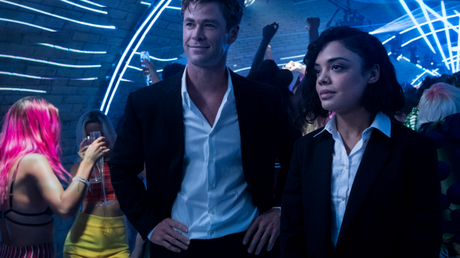
Indeed, MIB: International replicates the buddy comedy playbook, following two mismatched partners who get on each other's nerves but gradually get to a point where they can't imagine being apart. Their case takes them across the world and into various criminal underworlds only to then reveal the biggest criminal might have been in their midst the entire time. In the end, the door is left open for them to reteam multiple times down the road, at least until the money dries up.
So, in one breath MIB: International aspires to ape the conventions of small cop comedies just like Sonnenfeld did. In another, far more long-winded breath, however, it wants to be an everything-to-everyone blockbuster for 2019. To compete, you have to up the scale to Disney levels. So, Sony hired Fast & Furious 8's F. Scott Gray to direct and Mission: Impossible's legendary stunt coordinator Wade Eastwood to dream up action sequences worthy of a modern blockbuster. MIB: International is thus exactly the kind of film Barry Sonnenfield wouldn't know how to direct.
It almost works. There are stretches where that old Ragnarok chemistry carries the film, but then Art Marcum and Matt Holloway's (the duo most recently responsible for Transformers: The Last Knight) script gets in the way. Teased backstories, particularly about H's apparent fall from grace, lead to underwhelming reveals. The film rarely flows as naturally as a Marvel movie would. Character arcs and scene transitions, for example, frequently play as rushed or awkward or both. The signature humor and sense of discovery of the Sonnenfeld films has been hacked away. A CGI comic relief sidekick voiced by Kumail Nanjiani gets some good lines but also feels as if the characters on screen and filmmakers behind the scenes don't remember he's even there.
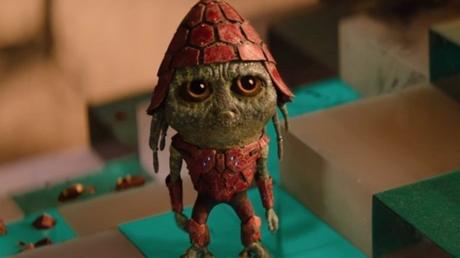
Still, recreating that Ragnarok magic might prove as elusive as Sony's now decades-long quest to recapture that 1997 Men in Black magic. The idea to take a couple of Disney actors and put them in your IP feels like it should have worked. It's not even a new concept. As Thompsons told TotalFilm, "It used to happen all the time in Hollywood where you used to get these pairings of actors, that you like to see in a multitude of scenarios. We love that callback to that Old Hollywood idea where you got to follow these two actors through different things."
But as with so much else these days the answer is actually quite simple: how many people actually wanted to see a new Men in Black movie? Not enough, partially because Disney's IP is almost always better than yours.
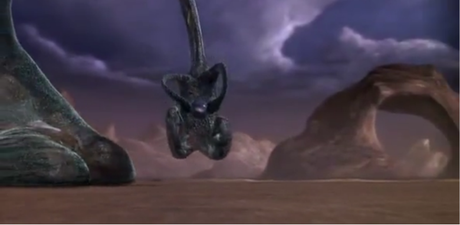
In 1997, Sonnenfeld chose to end his film with an out-of-nowhere, completely bonkers reveal that we're all just pawns in a tentacled alien's game of marbles with planets and galaxies. In 2019, that tentacled alien is Disney, and MIB: International barely even qualifies as a player in the game.
Sources: Blockbuster: How Hollywood Learned to Stop Worrying and Love the Bomb by Tom Shone, The Big Picture by Ben Fritz, TotalFilm
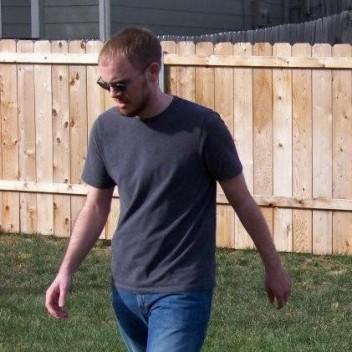
Grew up obsessing over movies and TV shows. Worked in a video store. Minored in film at college because my college didn't offer a film major. Worked in academia for a while. Have been freelance writing and running this blog since 2013. View all posts by Kelly Konda

